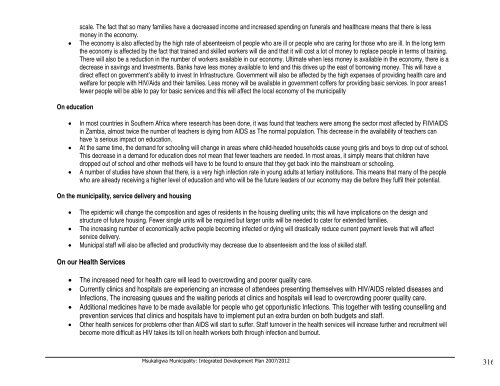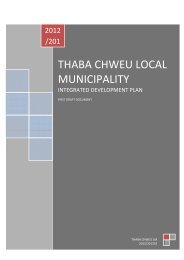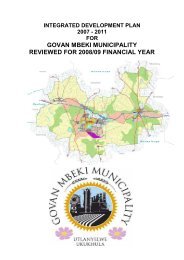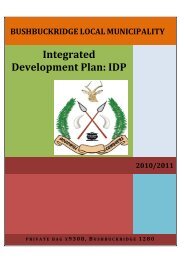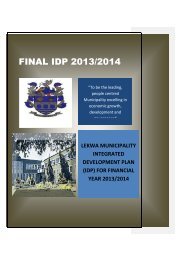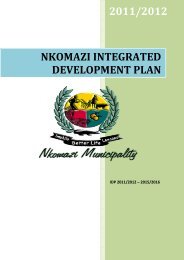- Page 6 and 7:
IIFOREWORDS BY THE MUNICIPAL MANAGE
- Page 8 and 9:
The Msukaligwa Municipality publish
- Page 10 and 11:
1 IDP OVERVIEW1.1 IntroductionMsuka
- Page 12 and 13:
Locality of the MunicipalityMsukali
- Page 14 and 15:
The table above reflects institutio
- Page 16 and 17:
settlements as result of population
- Page 18 and 19:
TourismIn terms of statistics deriv
- Page 20 and 21:
Active LRAD/ Labour Tenants Project
- Page 22 and 23:
Batwseneng 380ha R 850 000,00 Msuka
- Page 24 and 25:
Capital Expenditure versus Operatin
- Page 26 and 27:
services to rural communities/farms
- Page 28 and 29:
Types of Access to WaterTable 17Typ
- Page 30 and 31:
2.1.2. SanitationProper sanitation
- Page 32 and 33:
2.1.3. ElectricityProclaimed Areas
- Page 35 and 36:
Provision has been made for land No
- Page 37 and 38:
Roads Agency and the maintenance of
- Page 39 and 40:
• Technical Skills Training and E
- Page 41 and 42:
Table 28FormalHouseholdsInformalHou
- Page 43 and 44:
The table below shows the 2005 wast
- Page 45 and 46:
Number of Formal Households with Ac
- Page 47 and 48:
The table above reflect the financi
- Page 49 and 50:
Consultative forums and mechanism f
- Page 51 and 52:
2.4.1. THE IDP PROCESS PLANThe IDP
- Page 53 and 54:
forum- Negotiation for Funds- Harmo
- Page 55 and 56:
Figure 1: Msukaligwa Municipality B
- Page 57 and 58:
disability, youth issues and ensuri
- Page 59 and 60:
monitoring, evaluation and review a
- Page 61 and 62:
2.6. MUNICIPAL OBJECTIVES AND STRAT
- Page 63 and 64:
5. Regional planning for sports cen
- Page 65 and 66:
• Service delivery mechanism• P
- Page 67 and 68:
KPA 3: LocalEconomicDevelopmentKPA
- Page 69 and 70:
2.10. LOCAL ECONOMIC DEVELOPMENTMsu
- Page 71 and 72:
Both strategies have not yet been d
- Page 73 and 74:
2.11.2. Basic Average Community Nee
- Page 75 and 76:
2.11.4. Results of Socio-Economic D
- Page 77 and 78:
Economical Development is also a ve
- Page 79 and 80:
• Economic Development (i.e. inve
- Page 81 and 82:
Sanitary ServicesTable 42Project De
- Page 83 and 84:
ProjectlinkedhousingprojectIntegrat
- Page 85 and 86:
AssetmanagementtrainingWorkshop/sem
- Page 87 and 88:
soya beansproductionSizenzelesoya b
- Page 89 and 90:
o Based on the ward development pla
- Page 91 and 92:
3.1.6. Establishment and Control of
- Page 93 and 94:
3.1.10. Financial ServicesObjective
- Page 95 and 96:
o The municipality will through its
- Page 97 and 98:
CM52CM53CM54PurchaseofFurniture,equ
- Page 99 and 100:
CM83CM84CM88CM89CM90CM91CM92First a
- Page 101 and 102:
CHH1CHH2CHH3CHH4CHH5CHH6N INDICATOR
- Page 103 and 104:
CHH18CHH19CHH21CHH22CHH35CHH37CHH39
- Page 105 and 106:
CHP42CHP43CHP44CHP45CHP46CHP47CHP48
- Page 107 and 108:
CHP137CHP138CHP139CHP140Cleaningof
- Page 109 and 110:
CHC85CHC86CHC87Buying offridge-Emth
- Page 111 and 112:
Social Services : Hiv/AidsIDP NOCHS
- Page 113 and 114:
Waste ManagementIDP NOCHW58CHW59CHW
- Page 115 and 116:
CHW124CHW125CHW131CHW146Purchaseof
- Page 117 and 118:
CM93Buildingof newlibraryTo meetlib
- Page 119 and 120:
CHR06CHR07CHR08CHR09CHR10CHR11Purch
- Page 121 and 122:
F 11F 12F 13F 14F 15NormalisationPr
- Page 123 and 124:
EE006EE007ProvideStreetlights kwade
- Page 125 and 126:
EE065EE105EE106Electrification of 6
- Page 127 and 128:
BreytenEE123EE124EE125EE126EE127EE1
- Page 129 and 130:
RoadsIDP NOER 01PROJECTDESCRIPTIONI
- Page 131 and 132:
ER 11ER 12ER 13ER 14ER 15Rehabilita
- Page 133 and 134:
ER 26RoadnetworkSilindileProvideint
- Page 135 and 136:
ER 44ER 45Re-gravelof roadsLothair
- Page 137 and 138:
ER 65ER 66ER 67ER 68ER 69(a)ER 69(b
- Page 139 and 140:
ER 75ER 76ER 77Grading ofaccessroad
- Page 141 and 142:
ER86ER 87ER88Internalroadnetworkati
- Page 143 and 144:
ER98ER99ER100ER101ER102ER103ER104Co
- Page 145 and 146:
EB 06(b)EB 07(a)EB 07(b)EB 08(a)EB
- Page 147 and 148:
EB 20UpgradingofHawkersStallMainten
- Page 149 and 150:
ESN05ESN06ESN07ESNN01ESNN02ESNN03ES
- Page 151 and 152:
IDP NOPROJECTDESCRIPTIONSTRATEGICOB
- Page 153 and 154:
EWNN 01Purchasingofmachineryandequi
- Page 155 and 156:
EWNN 17EWNN 18EWNN 19EWNN 20EWNN 21
- Page 157 and 158:
EWNN 36EWNN 37EWNN 38Maintenance bu
- Page 159 and 160:
andEverestpipesEWP13EWP14EWP15EWP16
- Page 161 and 162:
PS 8PS 9PS 10PS 11Upgradeof rescuee
- Page 163 and 164:
PS 22PS 23Esatablishment ofFire and
- Page 165 and 166:
PS 26PS 27PS 28PS 29Upgradeof testi
- Page 167 and 168:
PS36Safety &SecurityToimprovethecom
- Page 169 and 170:
PS51PS52PS53PS54TrafficImplementroa
- Page 171 and 172:
areas and criteria to be followed f
- Page 173 and 174:
6. ANNEXURESThe following annexures
- Page 175 and 176:
ANNEXURE BSECTOR PLANSPROGRAMME A -
- Page 177 and 178:
+ !"#$%&!'( $(%)&)) / .
- Page 179 and 180:
+ !"#$%&!'( $(% )&)), , / /
- Page 181 and 182:
+ !"#$%&!'( $(% )&)) +
- Page 183 and 184:
+ !"#$%&!'( $(% )&)) . +
- Page 185 and 186:
Program ASpatial DevelopmentFramewo
- Page 187 and 188:
SPATIAL DEVELOPMENT FRAMEWORK — M
- Page 189 and 190:
Au non-residential development whic
- Page 191 and 192:
The life span of the existing cemet
- Page 193 and 194:
Future low-Income housing has been
- Page 195 and 196:
Program BLocal EconomicDevelopment
- Page 197 and 198:
2.7.2 Projected impact of HIV/AIDS
- Page 199 and 200:
SECTION 1 BACKCROUNDA critical need
- Page 201 and 202:
1.3 PURPOSEThe purpose of this docu
- Page 203 and 204:
Msukaligwa Municipality: Integrated
- Page 205 and 206:
The aim of this section is to place
- Page 207 and 208:
The gender profile of the study are
- Page 209 and 210:
The esteemed total population In Ms
- Page 211 and 212:
Ermelo / WesseltonThe following tab
- Page 213 and 214:
Table 2.7 - Lothair/SilindileNo of
- Page 215 and 216:
From the results of Figure 2 a clea
- Page 217 and 218:
ecause of the need for medication a
- Page 219 and 220:
The important points of discussion
- Page 221 and 222:
4.2 ECONOMIC SECTORS WORKSHOPSIn a
- Page 223 and 224:
Davel/KwadelaDavel used to be an ac
- Page 225 and 226:
3.4 OCCUPATIONAL PROFILEThe occupat
- Page 227 and 228:
Figure 3.2 shows that a high percen
- Page 229 and 230:
Attendees:The following delegates a
- Page 231 and 232:
The date of this meeting coincided
- Page 233 and 234:
• KeriV3• Rietspruit Crushers
- Page 235 and 236:
During the discussions the followin
- Page 237 and 238:
The LED Forum will have fundamental
- Page 239 and 240:
- Management of the HIVIAIDS impact
- Page 241 and 242:
In addition to the above mentioned
- Page 243 and 244:
are. Existing businesses get little
- Page 245 and 246:
thereafter. Many LEID initiatives h
- Page 247 and 248:
Enabling or providing skills traini
- Page 249 and 250:
Developing cluster related marketin
- Page 251 and 252:
Infrastructure Issues• Poor infra
- Page 253 and 254:
Should the Program to Address the I
- Page 255 and 256:
• The idea is that more experienc
- Page 257 and 258:
• To consolidate, integrate and e
- Page 259 and 260:
• the abundance of business-and t
- Page 261 and 262: MSUKALIGWA MUNICIPALITYDISASTER MAN
- Page 263 and 264: The provision on a humanitarian bas
- Page 265 and 266: Msukaligwa Municipality Water Resou
- Page 267 and 268: 4. PREVENTION AND MITIGATION STRATE
- Page 269 and 270: DEPARTMENTS INVOLVED IN JOINT OPERA
- Page 271 and 272: • Other discipline representative
- Page 273 and 274: • External resources6.5 AN INCIDE
- Page 275 and 276: DEPARTMENTS INVOLVED IN JOINT OPERA
- Page 277 and 278: 5.8 AN INCIDENT INVOLVING A RUNAWAY
- Page 279 and 280: • Implementation of salvage and v
- Page 281 and 282: • Mpumalanga District Boat Club5.
- Page 283 and 284: • Finance• Engineering• Corpo
- Page 285 and 286: • Director of Public Safety estab
- Page 287 and 288: DISCIPLINES INVOLVED IN JOINT OPERA
- Page 289 and 290: • Approve the plan for demobiliza
- Page 291 and 292: • Review missions, agency assignm
- Page 293 and 294: • Identify the need for specializ
- Page 295 and 296: 6.8.2 Staff reporting to Finance Of
- Page 297 and 298: MSUKALIGWA MUNICIPALITY 5 YEAR FINA
- Page 299 and 300: • Financial by-lawsFinancial by-l
- Page 301 and 302: • To curtail expenditure accordin
- Page 303 and 304: 3. FIVE YEAR REVENUE AND EXPENDITUR
- Page 305 and 306: Annexure A15 Year Revenue and Expen
- Page 307 and 308: Program EHIV/AIDS PLANMsukaligwa Mu
- Page 309 and 310: PART A: INTRODUCTIONBackgroundThe E
- Page 311: increase to around 2 million by 201
- Page 315 and 316: Priority needs• Training of more
- Page 317 and 318: • Patients’ empowerment program
- Page 319 and 320: PART D; KEY RESPONSES NEEDED1. Educ
- Page 321 and 322: Msukaligwa Municipality: Integrated
- Page 323 and 324: 3. Care for orphansProblem statemen
- Page 325 and 326: Msukaligwa Municipality: Integrated
- Page 327 and 328: Not yet in place and still to be es
- Page 329 and 330: Not yet in place and still to be es
- Page 331 and 332: Not yet in place and still to be es
- Page 333 and 334: Not yet in place and still to be es
- Page 335 and 336: Out dated and need to be reviewed.M
- Page 337 and 338: Not yet in place and still to be es
- Page 339 and 340: Not yet in place and still to be es
- Page 341 and 342: The main document is in place but t
- Page 343 and 344: Msukaligwa Municipality: Integrated
- Page 345 and 346: Not yet in place and still to be es
- Page 347 and 348: Not yet in place and still to be es
- Page 349 and 350: Not yet in place and still to be es


